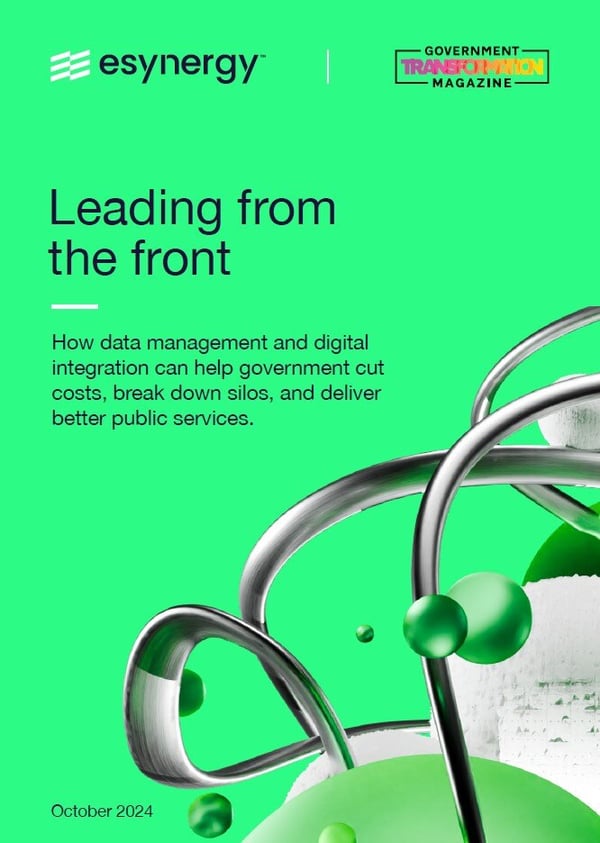Finding the balance between public, private and personal data
Whether booking a holiday, logging into Netflix or online shopping, people have rapidly come to expect and demand effortless digital experiences — and the niceties of user agreements and consent for sharing personal data very much take a back seat to the desire for convenience.
In the public sector, the situation is reversed. Citizen safety has historically taken priority over user experience, which has created a safer standard of digital service delivery than most citizens have become accustomed to in the breakneck pace of the private sphere.
Very few would describe navigating systems like healthcare and tax as easy as their ‘consumer’ purchases. Privacy concerns have meant that these important life-changing systems aren't always seamless, with personal data protected and stored within more than one siloed system — creating the risk of inaccuracies and multiple digital ‘versions’ of citizens existing across disparate systems.
When it comes to digital services, an easy, seamless experience is preferred when personal safety isn’t obviously at stake — whether they’re buying a plane ticket, ordering their groceries, or dealing with their bank. At least, that’s the private sector story. Things are quite different for the public sector, where historically protection of citizen safety has forced a different pace of digital service delivery at a higher standard of care.
The Estonian government is often considered a blueprint for both digital services and governance: It took a digital-first approach after gaining independence and introduced high-quality systems like e-health to their citizens. This process allows for a more streamlined approach to patient health data records, enabling an entire generation to grow up accustomed to being digital citizens — contributing to Estonia now being considered one of the most tech-savvy societies in the world.
Whereas, in the UK — even though there has been some significant progress in recent years with the creation of the Government Digital Service and their One Login project — there’s still a lot of work to be done by a much larger and more complex nation. And that starts with realising the full potential of personal data managed by government bodies with a clearer view of a citizen, with intent to achieve a more bespoke public service without compromising on safety.
Historically, in the rush to fulfil this ambition and secure access to critical personal data means that organisations, in both the public and private sectors, lose sight of the people affected most. More often than not, data collected is haphazardly confined to silos that aren’t managed in the citizens' best interests.
However, data is most valuable when citizens actively can curate their own desires and aims, painting a complete picture of their needs and wants on an infinite scale of sources. This ultimately allows for a less transactional relationship, a better quality of personalisation in digital services and subsequently, more engaged citizens.
Now the challenge for the public sector is to unify legacy data silos, open up new exciting services, and provide personalised experiences for citizens without compromising data privacy. And given the current lack of trust, from corporations to governments, it’s essential that the right balance is found.
Winning back public trust is vital for public bodies
Digital services are at their most effective when citizens feel like their individual needs and circumstances are fully understood. Yet, there’s also a demand among citizens for anyone handling their digital selves to be fully transparent about their level of knowledge of them and how that data is being used.
The payoff for finding the right balance is huge. Thriving economies are now driven by sharing personal data for mutual benefits. So having access to data is invaluable to representative governments seeking to produce genuine insights and make services optimally responsive to their citizens.
Having said that, a significant hurdle to optimising data flow through the public sector is the current condition of most data ecosystems — isolated databases which often rely on lengthy information exchanges and expired data. Citizens also lack a straightforward way to provide consent for their data to be processed or shared. None of this is conducive to a dynamic or productive data settlement.
Best practice for digital service
A clear example of best practice for digital services can be found in the autonomous Flanders region of Belgium, home to 6.5 million citizens. Digital Flanders, the digital agency of the Flemish government, was tasked with developing the strategy and software that would create opportunities for citizens and businesses alike — while also building citizens’ trust in sharing data securely and privately.
This broad remit echoes the ambitions of the UK’s own ‘Roadmap for Digital and Data’. At its core, achieving this goal — in both Flanders and the UK — is as much a technological challenge as a policy one.
Digital Flanders relied on the adoption of an enterprise-ready version of the W3C Solid platform developed by Sir Tim Berners-Lee. This application protocol facilitates the secure storage of citizen data in decentralised ‘Pods’. Solid technology is now a part of the Flemish data utility company Athumi, which has since emerged as a trailblazer in developing use cases for digital services in Flanders and promoting EU-wide data-sharing initiatives.
Through this platform, citizens can control their data, choosing when and what information is shared with organisations and for how long. All citizen data is stored in a secure Solid Pod online, which can be used by both public and private entities participating in this new Flanders data ecosystem. In this system, any participant can request access to personal data from the citizen for a particular purpose or service, and it is up to the citizen to decide whether to grant access on a case-by-case basis.
The new status quo
Digital Flanders has achieved a significant breakthrough with its data utility company. Now, citizen data can be securely stored at the individual level, in service of the citizen’s needs, as it should be in a free and open society.
Athumi is already developing a number of SOLID-based data solutions, such as tools to share diploma and payroll information more effectively.
In the future, the people of Flanders may be able to access many government services through a single login using their Solid Pod — bringing together previously disconnected aspects of public life into a unified and cohesive entity.
As citizens of Flanders benefit from this development, it will serve as a model for other governments and corporations as well. With time, public digital services could match or exceed the ease of private sector interfaces while maintaining the safety measures expected of the public sector and advancing the scope and sophistication of digital living.






